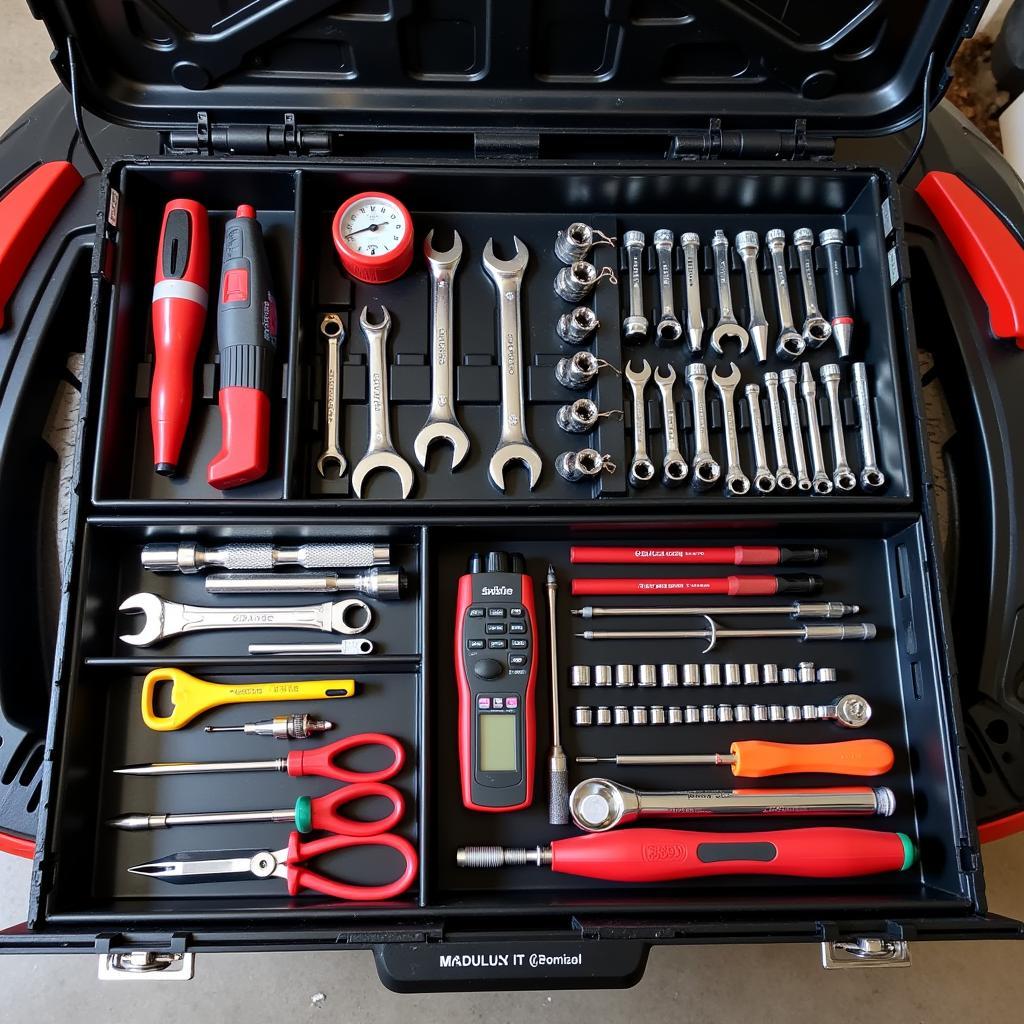What Tools Do I Need To Service My Car? This is a common question for car owners looking to save money and gain a deeper understanding of their vehicles. Whether you’re performing routine maintenance or tackling more complex repairs, having the right tools is essential. This comprehensive guide will equip you with the knowledge to build a well-rounded toolkit tailored to your car maintenance needs. Check out our guide on on board car diagnostics tool.
Essential Tools for Basic Car Maintenance
Even simple car maintenance tasks require a basic set of tools. These tools allow you to perform routine checks, top-ups, and minor repairs, saving you trips to the mechanic for simple jobs.
- Screwdrivers: A set of both Phillips and flathead screwdrivers in various sizes is a must-have. You’ll need these for everything from tightening loose screws to replacing battery terminals.
- Wrenches: Invest in a combination wrench set (both open-end and box-end) in both metric and SAE sizes. These are essential for removing and tightening nuts and bolts.
- Pliers: Needle-nose pliers are perfect for gripping small parts and wires, while adjustable pliers can handle larger jobs.
- Jack and Jack Stands: These are crucial for raising your car safely to change tires or work underneath. Never work under a car supported only by a jack.
- Tire Pressure Gauge: Maintaining proper tire pressure is essential for fuel efficiency and safety. A digital gauge offers precise readings.
- Funnel: For adding fluids like oil, coolant, or windshield washer fluid without spills.
- Work Gloves: Protect your hands from grease and grime while working on your car.
Diagnostic Tools for Troubleshooting
Modern cars are increasingly reliant on electronics, making diagnostic tools indispensable for troubleshooting.
- OBD-II Scanner: An On-Board Diagnostics (OBD-II) scanner is a must-have for reading and clearing diagnostic trouble codes (DTCs). These codes provide valuable insights into the health of your car’s systems.
- Multimeter: This versatile tool measures voltage, current, and resistance, helping you diagnose electrical problems.
Advanced Tools for More Complex Repairs
If you’re tackling more advanced repairs, you’ll need specialized tools. These tools require a higher level of mechanical knowledge and skill.
- Socket Set: A comprehensive socket set with various drive sizes (1/4″, 3/8″, 1/2″) and extensions allows you to access hard-to-reach fasteners.
- Torque Wrench: Applying the correct torque to fasteners is critical for preventing damage. A torque wrench ensures precision tightening.
- Brake Bleeder Kit: Essential for bleeding brakes and replacing brake fluid. This helps maintain optimal braking performance.
“A good torque wrench is an investment in preventing stripped bolts and broken parts,” says automotive expert, Michael Davies, ASE Certified Master Technician. “It’s a must-have for anyone working on their car.”
Building Your Car Maintenance Toolkit: A Step-by-Step Guide
- Assess Your Needs: Determine the types of maintenance you plan to perform. Start with basic tools and add specialized tools as needed.
- Set a Budget: Quality tools can be expensive. Prioritize essential tools and gradually expand your toolkit over time.
- Choose Reputable Brands: Invest in tools from well-known manufacturers. Quality tools are more durable and reliable.
- Organize Your Toolkit: Keep your tools organized and accessible in a toolbox or tool chest. This saves time and frustration when you need a specific tool.
You might find our reviews on the harbor freight car diagnostic tool useful.
“Investing in a well-organized toolkit can make any car maintenance task easier and more enjoyable,” says Sarah Miller, Lead Mechanic at Miller Automotive. “Knowing where everything is saves valuable time and frustration.”
 Organized Car Toolkit for Efficient Maintenance
Organized Car Toolkit for Efficient Maintenance
Conclusion
Having the right tools allows you to perform essential car maintenance tasks, saving you money and empowering you to take control of your vehicle’s upkeep. What tools do I need to service my car? The answer depends on your individual needs and skill level. Start with the basics and gradually expand your toolkit as you gain experience. Be sure to check out our list of recommended car body repair tools kits.
FAQ
- What is an OBD-II scanner? An OBD-II scanner is a device that connects to your car’s diagnostic port to read and clear trouble codes.
- Why is a torque wrench important? A torque wrench ensures that fasteners are tightened to the correct specification, preventing damage.
- Do I need metric or SAE tools? Most modern cars use metric fasteners, but older models may use SAE. It’s best to have both.
- Where can I learn more about car maintenance? Online resources, repair manuals, and community colleges offer valuable information.
- How often should I service my car? Refer to your owner’s manual for recommended maintenance intervals.
Need assistance with car diagnostics or looking for specialized tools? Contact us via WhatsApp: +1(641)206-8880, Email: [email protected] or visit our workshop at 910 Cedar Lane, Chicago, IL 60605, USA. Our customer service team is available 24/7. You may also find our car wifi obd 2 obd2 obdii scan tool foseal scanner review helpful. Also, take a look at our review client care tools list.

Leave a Reply